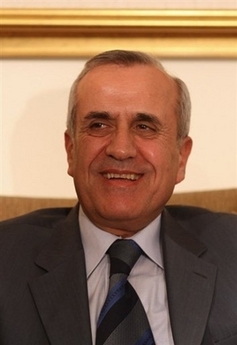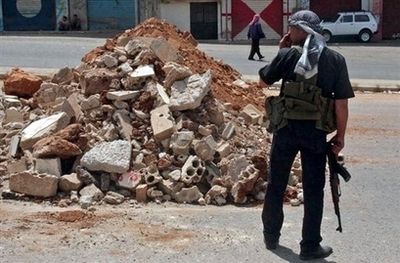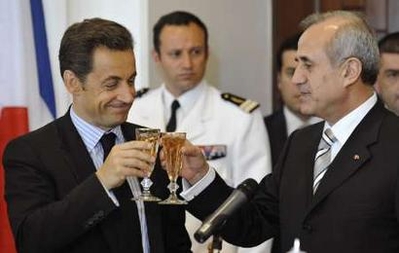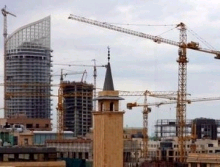 Beirut - Lebanon's newly-elected President Michel Suleiman has said Lebanon will present new documents to the United Nations proving that the Israeli-occupied Shebaa Farms area is Lebanese, a move that could initiate diplomatic efforts aimed at finding a solution to the issue. According to Lebanese radio reports, Suleiman made the announcement to British Foreign Secretary David Miliband who was visiting Lebanon Monday. Media reports on Tuesday said the president stressed to Miliband Lebanon's right to regain its sovereignty over the Shebaa farms zone, a tiny enclave, located where the borders of Lebanon, Israel and Syria meet. It has been controlled by Israel since its withdrawal from southern Lebanon in 2000.
Beirut - Lebanon's newly-elected President Michel Suleiman has said Lebanon will present new documents to the United Nations proving that the Israeli-occupied Shebaa Farms area is Lebanese, a move that could initiate diplomatic efforts aimed at finding a solution to the issue. According to Lebanese radio reports, Suleiman made the announcement to British Foreign Secretary David Miliband who was visiting Lebanon Monday. Media reports on Tuesday said the president stressed to Miliband Lebanon's right to regain its sovereignty over the Shebaa farms zone, a tiny enclave, located where the borders of Lebanon, Israel and Syria meet. It has been controlled by Israel since its withdrawal from southern Lebanon in 2000.
On Monday, the London-based Al-Hayat newspaper quoted Lebanese security sources as saying that the Shebaa Farms issue was also discussed during talks between Suleiman and French President Nicolas Sarkozy, who visited Lebanon last Saturday. The sources said that in Suleiman's view an Israeli withdrawal from the area "would pave the way for a defence strategy agreement among the Lebanese and a settlement of the (Hezbollah) arms issue." An-Nahar daily on Tuesday quoted diplomatic sources as saying that the British Foreign Secretary promised Lebanese leaders during his visit to Beirut that he would discuss the Shebaa issue with UN chief Ban Ki-moon in London next week. The sources said that Miliband would talk with Ban on ways to convince Israel to withdraw from the farms area after Suleiman revealed that Lebanon had new documents proving the ownership of Shebaa. Miliband asked Suleiman to send copies of the documents to the British government, according to the sources. "As a member of the UN Security Council, we are fully committed to playing our part and to urge others to do so in ensuring that all of Resolution 1701 is put into practice, including the Shebaa Farms issue," Miliband said Monday. Resolution 1701 brought an end to a devastating 33-day war between Israel and Hezbollah in the summer of 2006 and called for the UN secretary general to make a proposal for the delineation of the disputed Shebaa Farms area.
The United Nations has said in the past that Shebaa is Syrian territory, captured by Israel in the 1967 war: Syria and Lebanon maintain that it is Lebanese land. Earlier this year, UN mapping experts have determined that the farms are Lebanese territory and that international law requires Israel's withdrawal, according to a well-informed UN source in Lebanon. According to a Lebanese government source, the UN suggested earlier this year, that the Shebaa Farms be placed under UN jurisdiction once agreement is reached with Jerusalem. The UN's former Lebanon envoy Geir Pederson is said to have informed Israeli officials that "that the UN believes that there is merit in the Lebanese claims of sovereignty over Shebaa Farms."
 Four people were wounded in armed clashes in eastern Lebanon overnight between supporters of the ruling majority and the Hezbollah opposition, security sources said on Monday. Armed men opened fire with machine guns, mortar rounds and rockets in the village of Saadnayel in the Bekaa Valley in the east of the country during the night and the tension lasted until dawn despite army intervention, the sources said.
Four people were wounded in armed clashes in eastern Lebanon overnight between supporters of the ruling majority and the Hezbollah opposition, security sources said on Monday. Armed men opened fire with machine guns, mortar rounds and rockets in the village of Saadnayel in the Bekaa Valley in the east of the country during the night and the tension lasted until dawn despite army intervention, the sources said.
Reports say fighting in the villages of Saadnayel and Taalabayeh was sparked by arguments among residents, which escalated into gun battles. The army says it is looking for those involved in the weekend's violence. Sporadic fighting has broken out in Lebanon despite May's peace deal which ended the 18-month political stalemate. The army moved into the Bekaa Valley villages on Monday to quell fighting between pro-and anti-government supporters. A local radio station reported that mortar rounds and rockets had been used but the army is said to have restored calm in both villages. The army says it has also carried out raids in the mountain village of Majdelbanna, in the Aley region, and has detained several people suspected of involvement in clashes there over the weekend.
 Nicolas Sarkozy, France's president, is visiting Lebanon as part of efforts to support national unity. The visit comes two weeks after Lebanese leaders sealed a power-sharing deal and elected Michel Sleiman as the country's president, ending an 18-month political standoff which had erupted into deadly clashes. Sarkozy was greeted at Beirut airport on Saturday by President General Sleiman, Fouad Siniora, Lebanon's prime minister, and Nabih Berri, the parliament speaker. Sarkozy's delegation includes Francois Fillon, the prime minister; Bernard Kouchner, the foreign minister; and Herve Morin, the defence minister. Sarkozy, heading a large delegation, arrived in Beirut for a one-day state visit. He became the first Western leader to visit the Lebanese capital since the election of President Michel Suleiman last month. Sarkozy was accompanied by Prime minister Fillon, senior ministers and leaders of all the main French political parties. He said his "exceptional" delegation reflected the strong bond between both countries.
Nicolas Sarkozy, France's president, is visiting Lebanon as part of efforts to support national unity. The visit comes two weeks after Lebanese leaders sealed a power-sharing deal and elected Michel Sleiman as the country's president, ending an 18-month political standoff which had erupted into deadly clashes. Sarkozy was greeted at Beirut airport on Saturday by President General Sleiman, Fouad Siniora, Lebanon's prime minister, and Nabih Berri, the parliament speaker. Sarkozy's delegation includes Francois Fillon, the prime minister; Bernard Kouchner, the foreign minister; and Herve Morin, the defence minister. Sarkozy, heading a large delegation, arrived in Beirut for a one-day state visit. He became the first Western leader to visit the Lebanese capital since the election of President Michel Suleiman last month. Sarkozy was accompanied by Prime minister Fillon, senior ministers and leaders of all the main French political parties. He said his "exceptional" delegation reflected the strong bond between both countries.
 By Ferry Biedermann in Beirut Last month, Beirut
By Ferry Biedermann in Beirut Last month, Beirut
Khazen History


Historical Feature:
Churches and Monasteries of the Khazen family

St. Anthony of Padua Church in Ballouneh
Mar Abda Church in Bakaatit Kanaan
Saint Michael Church in Bkaatouta
Saint Therese Church in Qolayaat
Saint Simeon Stylites (مار سمعان العامودي) Church In Ajaltoun
Virgin Mary Church (سيدة المعونات) in Sheilé
Assumption of Mary Church in Ballouneh
1 - The sword of the Maronite Prince
2 - LES KHAZEN CONSULS DE FRANCE
3 - LES MARONITES & LES KHAZEN
4 - LES MAAN & LES KHAZEN
5 - ORIGINE DE LA FAMILLE
Population Movements to Keserwan - The Khazens and The Maans
ما جاء عن الثورة في المقاطعة الكسروانية
ثورة أهالي كسروان على المشايخ الخوازنة وأسبابها
Origins of the "Prince of Maronite" Title
Growing diversity: the Khazin sheiks and the clergy in the first decades of the 18th century
Historical Members:
Barbar Beik El Khazen [English]
Patriach Toubia Kaiss El Khazen(Biography & Life Part1 Part2) (Arabic)
Patriach Youssef Dargham El Khazen (Cont'd)
Cheikh Bishara Jafal El Khazen
Patriarch Youssef Raji El Khazen
The Martyrs Cheikh Philippe & Cheikh Farid El Khazen
Cheikh Nawfal El Khazen (Consul De France)
Cheikh Hossun El Khazen (Consul De France)
Cheikh Abou-Nawfal El Khazen (Consul De France)
Cheikh Francis Abee Nader & his son Yousef
Cheikh Abou-Kanso El Khazen (Consul De France)
Cheikh Abou Nader El Khazen
Cheikh Chafic El Khazen
Cheikh Keserwan El Khazen
Cheikh Serhal El Khazen [English]
Cheikh Rafiq El Khazen [English]
Cheikh Hanna El Khazen
Cheikha Arzi El Khazen
Marie El Khazen